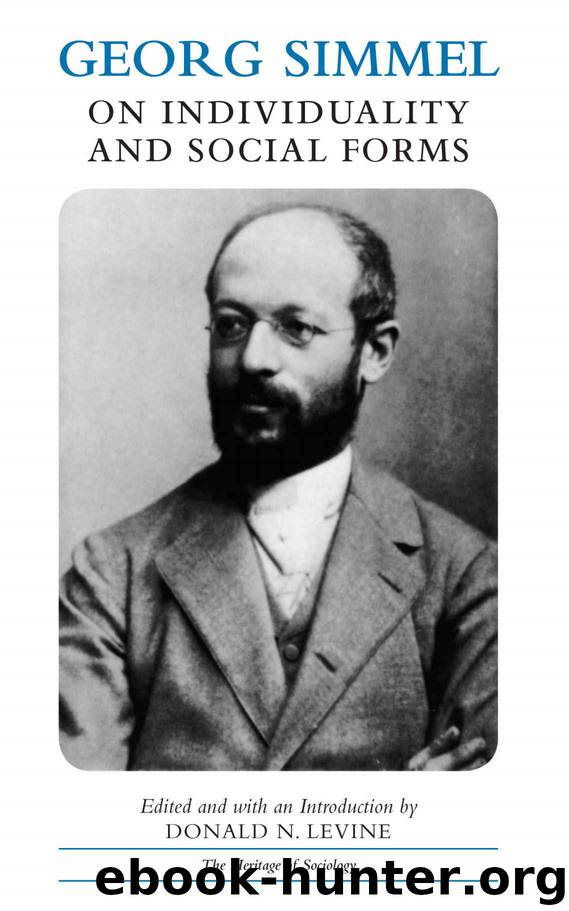Georg Simmel on Individuality and Social Forms (Heritage of Sociology Series) by Simmel Georg

Author:Simmel, Georg [Simmel, Georg]
Language: eng
Format: azw3
ISBN: 9780226924694
Publisher: University of Chicago Press
Published: 2011-08-18T16:00:00+00:00
13
THE ADVENTURER*
1911
Each segment of our conduct and experience bears a twofold meaning: it revolves about its own center, contains as much breadth and depth, joy and suffering, as the immediate experiencing gives it, and at the same time is a segment of a course of life—not only a circumscribed entity, but also a component of an organism. Both aspects, in various configurations, characterize everything that occurs in a life. Events which may be widely divergent in their bearing on life as a whole may nonetheless be quite similar to one another; or they may be incommensurate in their intrinsic meanings but so similar in respect to the roles they play in our total existence as to be interchangeable.
One of two experiences which are not particularly different in substance, as far as we can indicate it, may nevertheless be perceived as an “adventure” and the other not. The one receives the designation denied the other because of this difference in the relation to the whole of our life. More precisely, the most general form of adventure is its dropping out of the continuity of life. “Wholeness of life,” after all, refers to the fact that a consistent process runs through the individual components of life, however crassly and irreconcilably distinct they may be. What we call an adventure stands in contrast to that interlocking of life-links, to that feeling that those countercurrents, turnings, and knots still, after all, spin forth a continuous thread. An adventure is certainly a part of our existence, directly contiguous with other parts which precede and follow it; at the same time, however, in its deeper meaning, it occurs outside the usual continuity of this life. Nevertheless, it is distinct from all that is accidental and alien, merely touching life’s outer shell. While it falls outside the context of life, it falls, with this same movement, as it were, back into that context again, as will become clear later; it is a foreign body in our existence which is yet somehow connected with the center; the outside, if only by a long and unfamiliar detour, is formally an aspect of the inside.
Because of its place in our psychic life, a remembered adventure tends to take on the quality of a dream. Everyone knows how quickly we forget dreams because they, too, are placed outside the meaningful context of life-as-a-whole. What we designate as “dreamlike” is nothing but a memory which is bound to the unified, consistent life-process by fewer threads than are ordinary experiences. We might say that we localize our inability to assimilate to this process something experienced by imagining a dream in which it took place. The more “adventurous” an adventure, that is, the more fully it realizes its idea, the more “dreamlike” it becomes in our memory. It often moves so far away from the center of the ego and the course of life which the ego guides and organizes that we may think of it as something experienced by another person. How far
Download
This site does not store any files on its server. We only index and link to content provided by other sites. Please contact the content providers to delete copyright contents if any and email us, we'll remove relevant links or contents immediately.
| Anthropology | Archaeology |
| Philosophy | Politics & Government |
| Social Sciences | Sociology |
| Women's Studies |
Cecilia; Or, Memoirs of an Heiress — Volume 1 by Fanny Burney(32548)
Cecilia; Or, Memoirs of an Heiress — Volume 2 by Fanny Burney(31947)
Cecilia; Or, Memoirs of an Heiress — Volume 3 by Fanny Burney(31932)
The Great Music City by Andrea Baker(31917)
We're Going to Need More Wine by Gabrielle Union(19034)
All the Missing Girls by Megan Miranda(15958)
Pimp by Iceberg Slim(14488)
Bombshells: Glamour Girls of a Lifetime by Sullivan Steve(14057)
For the Love of Europe by Rick Steves(13914)
Norse Mythology by Gaiman Neil(13349)
Talking to Strangers by Malcolm Gladwell(13349)
Fifty Shades Freed by E L James(13233)
Mindhunter: Inside the FBI's Elite Serial Crime Unit by John E. Douglas & Mark Olshaker(9324)
Crazy Rich Asians by Kevin Kwan(9279)
The Lost Art of Listening by Michael P. Nichols(7494)
Enlightenment Now: The Case for Reason, Science, Humanism, and Progress by Steven Pinker(7306)
The Four Agreements by Don Miguel Ruiz(6745)
Bad Blood by John Carreyrou(6611)
Weapons of Math Destruction by Cathy O'Neil(6265)
